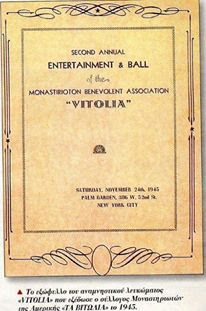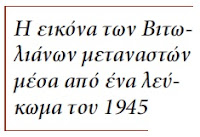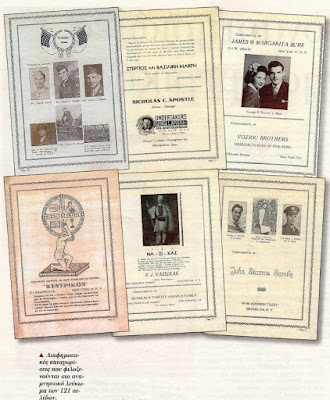By Magda Soulioti
A ‘helping each other’ Brotherhood of people from Monastir (and around Monastir) was established in New York in April 1944, entitled «BITOLIA".
The establishment of this association didn’t appear to be a typical procedure. It served specific necessities at that time. As Anastasios Grouia (President at that time) mentions in the preface of the bilingual (in American and Greek) album, the goal of the Brotherhood is twofold: (a) the objectives specified in the articles of the association and (b) the strengthening of relations among the emigrants (from Monastir) and the provision of "financial and any other help to our brothers and sisters who got damaged because of the war that just ended”.
So primarily, the Brotherhood tries to bring fellow immigrants to America together and to keep alive their ties with birthplace. However, the economic size (of the association) gives the form of necessity of the visions of the new established association. The old World (Europe) is just coming out of the long period of wars and trying to recover. Immigrants from Monastir, who emigrated to seek better fortune in America, organized the brotherhood there and its main purpose is to collect money for those ‘affected brothers’ at home.
Souvenir album
All the above is certified, by issuing of a souvenir diploma of 121 pages, presented here (published by the association in 1945), ie the second year of its existence. On the cover of the publication, the imminent second annual ball of the Brotherhood ‘BITOLIA’, that was scheduled for November 24th, is notified (Palm Garden, 306 W. 52nd St., New York City).
According to the artistic program of the event, published in Greek on pages 16-17, the Ball includes four parts: First, the implementation of «The star spangled banner» and the Greek National Anthem by the orchestra, in the second part, the performance of the musical comedy by Th. Sakellaridi, entitled "The hellcat", in the third, the short speech of the Association President, in the fourth, there was an interpretation of "the latest songs of Athens, performed by two well-known singers, Stella Kontoudi and Mary Sprigol, who have just come e from Greece'', while the fifth part of the evening promises “dance until morning hours with Mr. A. Sakellariou’s orchestra".
The short address of the President is on the second page of the edition, where he tries to give the position of the association, making references to the purposes of the Brotherhood, immediately after, there are the photographs of the Presidents of the United States, Harry Truman and Franklin D. Roosevelt, with complimentary captions for their warm support of the Greek rights in America.
Then the president of the club attempts a summary of the history of Monastir, in Greek and then in English, while Penelope Tsopanoglou (nee Dimitrios Megdani) from Paterson (California) signs the nostalgic "Feast of the Virgin" where she unfolds memories from her childhood at home. It is worth quoting a characteristic excerpt from the description of the feast (‘panigiri’):
"…Here is the nice ‘malebi (kind of candy)’! The seller’s voice sounds. We come closer and he shouts again: - Here's the nice ‘malebi’ with ‘gioulsoui’! They buy us and eat with tin spoons. Young children stand around, look at us and in our every spoon in mouth, they lick their lips. It is really strange! Those little kids felt more relished, without eating! [...] There is smoke and tingling odors just beyond - Kebabs, Κebabs! Delicious and fluffy like young girl’s kiss! [...]. They have three types of halvah in large baking pans (with ‘tahini’, white halvah with sesame and with walnut). The children are shouting the word ‘metalliki’ and are waiting in line. Pump!, Τhe Turkish seller’s blade sounds and the walnut halvah is cut like a piece of stone. [...] Just beyond, musicians play music and a circle group of young people are dancing. Their shoes were new and shined [...] The children are shouting: Warm ‘simitia’ (small pieces of bread), ‘giuvrekia’! Red apples, drenched in syrup and put on a large table, glisten in the morning sun”.
Then, the Board members of the club, some photos of people from Monastir who served «under the star and stripes», a poem describing the rise and decline of the city and finally some scattered little-verse rhyme references to the places surrounding Monastir, accompanying their photographs (Kruševo, Nizopolis, Megarovo, Turnovo, Gopesi, Milovista, Resna, Ohrid), are presented in the album.
Around 3/4 of the publication consist of 250 greeting congratulatory notes for the successful activities of the club and wishes to continue with the same zeal. The notes provide important information from Monastir immigrants in America. The family name and address is recorded on each note and some of them contain information on professional occupation, e.g. like the following: “Helen J. Stavros serves as a nurse in Brooklyn”. Essentially, this edition is a list of addresses or more accurately an advertising guide that aims to mutual support (a brotherhood of emigrants from ‘Bitolia’ is created, emigrants who are informed about where and how their compatriots live and mainly intend to support "brotherly" companies).
If we look at the album information in detail, we can draw conclusions that shed light on the economic and social position held by the community of Monastir (Bitolia) in the New World.
Almost all members seem to run their own businesses:
restaurants (25 and in very central locations in large urban centers) Fur-tailor shops, bakeries, grocery stores, funeral directors, florist shops, jewel shops, patisseries, law firms, hotels, pharmacies, cafes, transport and travel companies, photo shops, dairies and other such companies have owners from Bitolia.
Therefore, although emigrant from Monastir moved there as refugees, we find that they had rapid economic advancement that could mean two things:
1) that they migrated to America between the two World Wars, bringing with them their shavings from Monastir and investing them directly into businesses or
2) that Greek community of the Monastir was already active, as many had emigrated to America from late 19th century (ie before the First War) and had been aware of some profession or art, so it was not so difficult to enter the market and prosper.
Most likely was a combination of the above two cases, so this way Monastir people gradually were able to gain positions of high social status at that particular time. There should not certainly be considered a coincidence that those who declared their profession, nobody worked as a laborer or employee to any other company.
Typical case of an immigrant from Monastir is himself the president of the Brotherhood community, A. Grouias, who gives the information (in the advertisement back cover of the edition) that ‘Grouias Travel Bureau’ have been in operation in New York continuously "for the last 27 years", i.e. since 1918.
It is evident that the economic prosperity of a community promotes its cultural development, as well. That’s why we can justify the well organized Ball by the Fraternity, where, as we saw above, its artistic program includes a play, an orchestra for dancing and a concert by Greek artists. In other words, a full club event!
Advertisements that are hosted in the souvenir album of 121 pages:
From greeting cards (a sample):
Dear Compatriots:
Pull forward to your work, your collection is a gold ‘garden’, continue with the same zeal and emulation to achieve the purposes, that your brilliant Association of Monastir (Vitolia) undertook with zeal.
Our wishes for our brothers (in Monastir) who are in our thoughts and our mind.
STERGIOS AND VASILIKI MAKRI
Megarovo of Monastir
SPRINGFIELD OHIO
(Magda Souliotis attends Postgraduate Department of Thessaloniki Nursery School. She has published work on cultural events from Florina and Monastir regions).
Posted in Kathimerini (Καθημερινή), on Sunday, December 16th, 2001.
Translation (from Greek to English) by Tsiamitros Ioannis.





Δεν υπάρχουν σχόλια:
Δημοσίευση σχολίου
Η κόσμια κριτική και η ανταλλαγή απόψεων μεταξύ των σχολιαστών είναι σεβαστή. Σχόλια τα οποία υπεισέρχονται σε προσωπικά δεδομένα ή με υβριστικό περιεχόμενο να μην γίνονται. Τα σχόλια αποτελούν καθαρά προσωπικές απόψεις των συντακτών τους. Οι διαχειριστές δεν ευθύνονται σε καμία περίπτωση για τυχόν δημοσίευση υβριστικού ή παράνομου περιεχομένου στα σχόλια των αναρτήσεων.Τα σχόλια αυτά θα διαγράφονται με την πρώτη ευκαιρία.